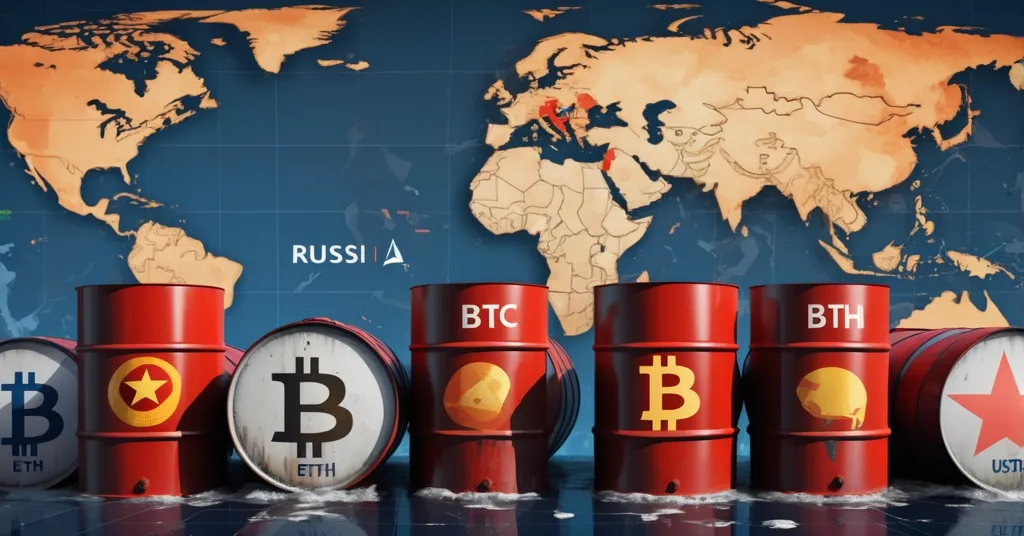Russia Bypasses Sanctions with BTC, ETH, USDT in Oil Trade with India, China

Russia’s Strategic Pivot: Using Bitcoin, Ethereum, and USDT to Bypass Western Sanctions in Oil Trade
Amidst escalating geopolitical tensions, Russia is increasingly using cryptocurrencies like Bitcoin (BTC), Ethereum (ETH), and USDT to trade oil with India and China, sidestepping Western sanctions and showcasing the disruptive potential of decentralized finance.
- Russia uses BTC, ETH, and USDT for oil trade with India and China.
- This practice is small but growing.
- EU sanctions have led to operational challenges for Russian crypto exchanges.
- The convenience and speed of crypto may continue to drive its use even if sanctions are lifted.
Last month, the European Union introduced new sanctions against Russia, intensifying the pressure on its cryptocurrency market. Russian crypto exchange Garantex, which was already sanctioned by the U.S. in 2022, faced further restrictions from the EU in February 2025. The latest blow came when Tether, the issuer of the USDT stablecoin, blocked Garantex’s wallets, freezing over 2.5 billion rubles and forcing the exchange to halt operations. Garantex’s team communicated the severity of the situation to its users:
Dear users! We have bad news. Tether has entered the war against the Russian crypto market and blocked our wallets worth more than 2.5 billion rubles. We are temporarily suspending all services, including cryptocurrency withdrawals, while our entire team solves this problem. We are fighting and will not give up! Please note that all USDT in Russian wallets is currently under threat. As always, we are the first but not the last. Garantex Team.
This incident highlights the vulnerabilities that crypto exchanges in Russia face amidst geopolitical strife. The use of cryptocurrencies for oil trade is not just a workaround for sanctions but a testament to the efficiency and speed of blockchain technology. Blockchain technology is a decentralized ledger of all transactions across a network, allowing for secure and swift exchanges without intermediaries. As noted by experts, “Even if sanctions were lifted and the US dollar was available for Russia to trade with again, many would likely continue to use crypto because of the technology’s convenience and transaction speed.”
Russia’s move towards cryptocurrencies is part of a broader trend among nations facing international sanctions. Countries like Iran and Venezuela have also explored digital currencies to bypass financial restrictions. This global shift highlights the dual nature of cryptocurrencies: they offer freedom and efficiency in transactions but also pose significant challenges for regulatory bodies seeking to enforce financial compliance. For more information on the context of these sanctions, refer to this resource.
The operational mechanics of these transactions involve multiple accounts and intermediaries to convert Indian rupees and Chinese yuan into Russian roubles. This process, while intricate, demonstrates the ability of cryptocurrencies to facilitate trade in the face of traditional financial barriers. Meanwhile, Russia’s own Central Bank Digital Currency (CBDC), the digital ruble, faces significant delays due to technical hurdles and inadequate IT infrastructure among banks, further solidifying the role of alternative cryptocurrencies like Bitcoin, Ethereum, and USDT in international trade. Discussions on platforms like Reddit delve deeper into these developments.
Despite the setbacks faced by exchanges like Garantex, the use of cryptocurrencies in Russia’s oil trade is expected to grow. This situation aligns with the concept of effective accelerationism, emphasizing the disruptive potential of decentralized finance in accelerating shifts toward new economic systems. However, the ethical implications of using cryptocurrencies to evade sanctions cannot be ignored. While they offer freedom and efficiency, their use to circumvent sanctions raises concerns about compliance and the potential for illicit finance. For further discussion on these ethical considerations, see this thread.
Russia’s increasing reliance on cryptocurrencies is a strategic pivot that demonstrates the resilience and potential of decentralized finance. Yet, it also underscores the need for robust compliance measures to mitigate risks associated with illicit finance and sanction evasion. As the crypto landscape continues to evolve, the balance between innovation and regulation will remain a critical point of contention and collaboration.
Key Questions and Takeaways
- What cryptocurrencies is Russia using to trade oil with India and China?
Russia is using Bitcoin (BTC), Ethereum (ETH), and USDT for these transactions.
- Why is Russia turning to cryptocurrencies for oil trade?
To bypass Western sanctions and convert Indian rupees and Chinese yuan into Russian roubles more easily.
- How have recent EU sanctions affected Russia’s crypto market?
The sanctions have led to operational challenges for Russian crypto exchanges, such as Garantex, which had to suspend services after Tether blocked its wallets.
- What impact might the lifting of sanctions have on Russia’s use of cryptocurrencies in oil trade?
Even if sanctions were lifted, the convenience and speed of cryptocurrency transactions might encourage continued use in Russia’s oil trade.
- What challenges do Russian crypto exchanges face due to these sanctions?
Russian crypto exchanges face operational disruptions, as seen with Garantex, which had to halt services after Tether blocked its wallets worth over 2.5 billion rubles.
- How does this situation align with the concept of effective accelerationism?
Russia’s use of cryptocurrencies to bypass sanctions demonstrates the disruptive potential of decentralized finance, accelerating the shift toward new economic systems.
- What are the ethical implications of using cryptocurrencies to evade sanctions?
While cryptocurrencies offer freedom and efficiency, their use to circumvent sanctions raises concerns about compliance and the potential for illicit finance.



